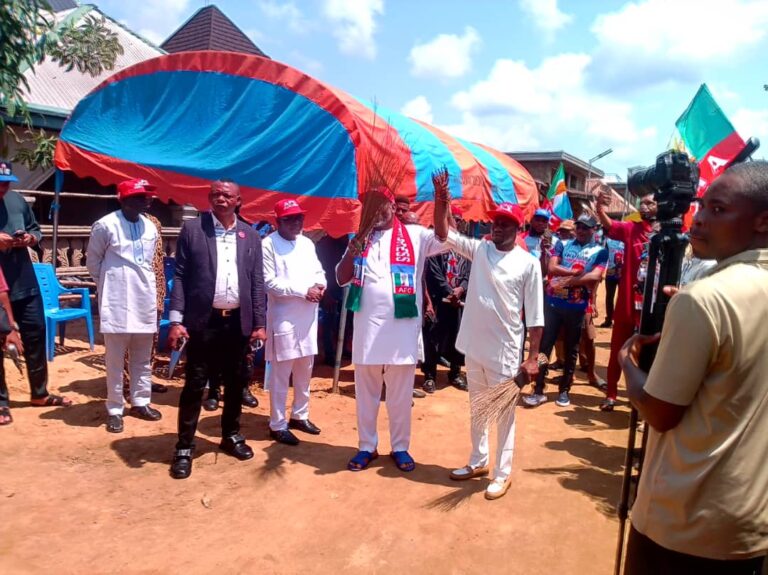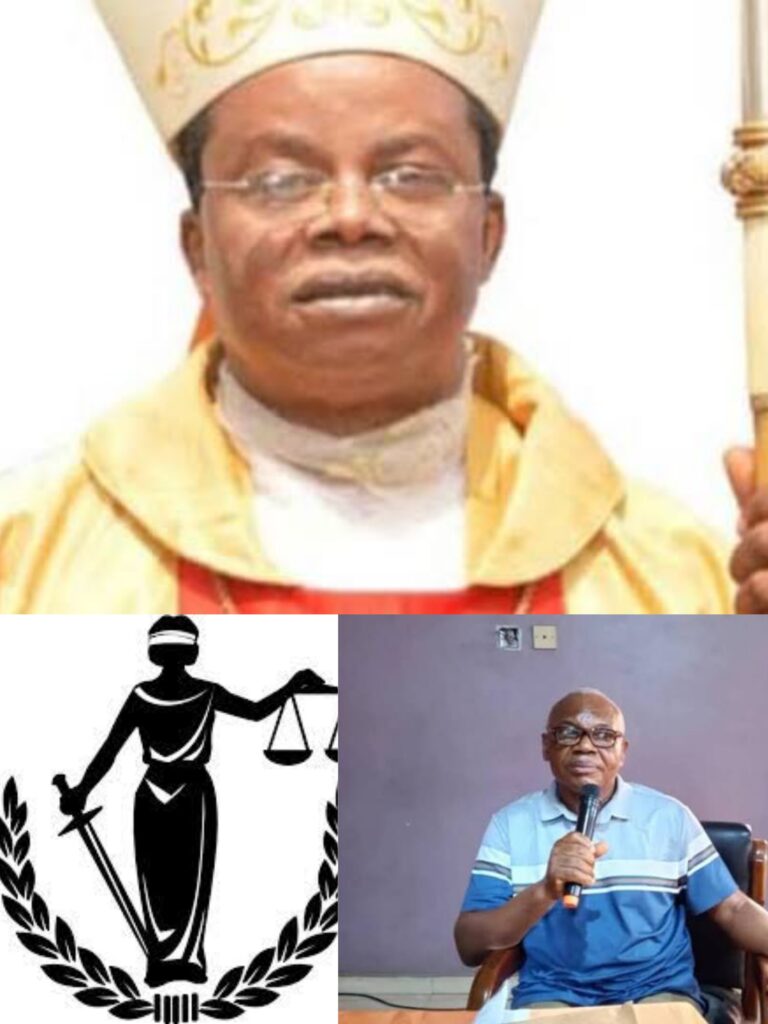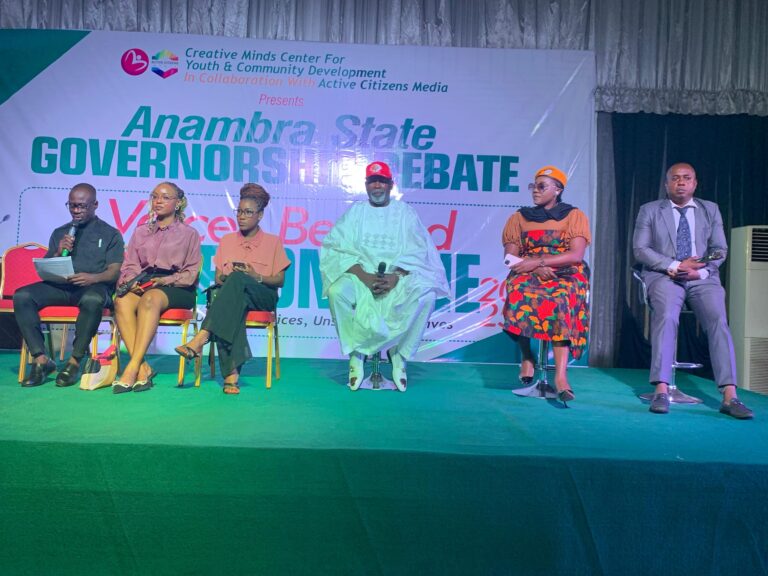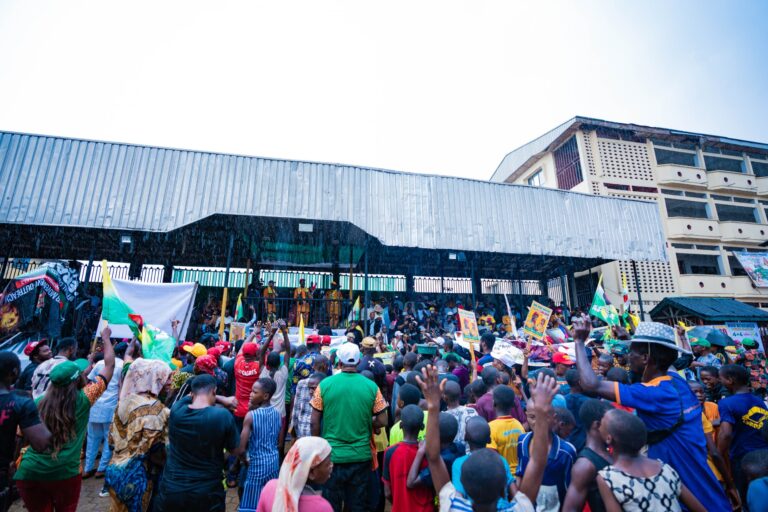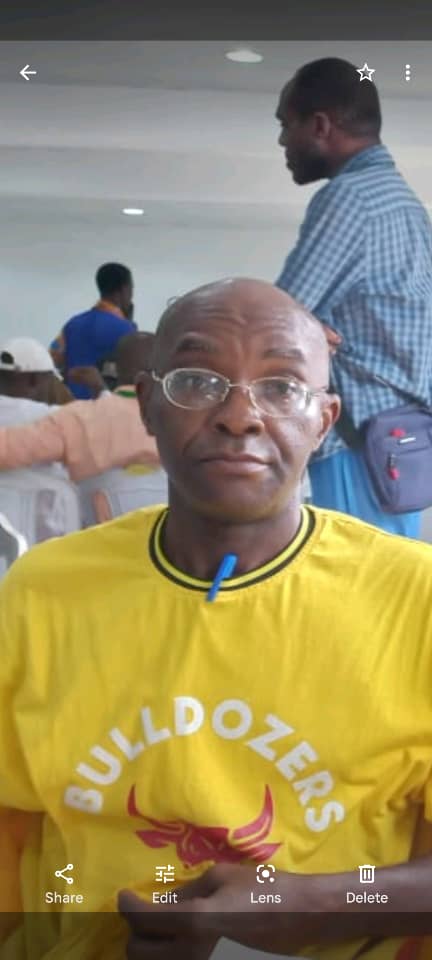
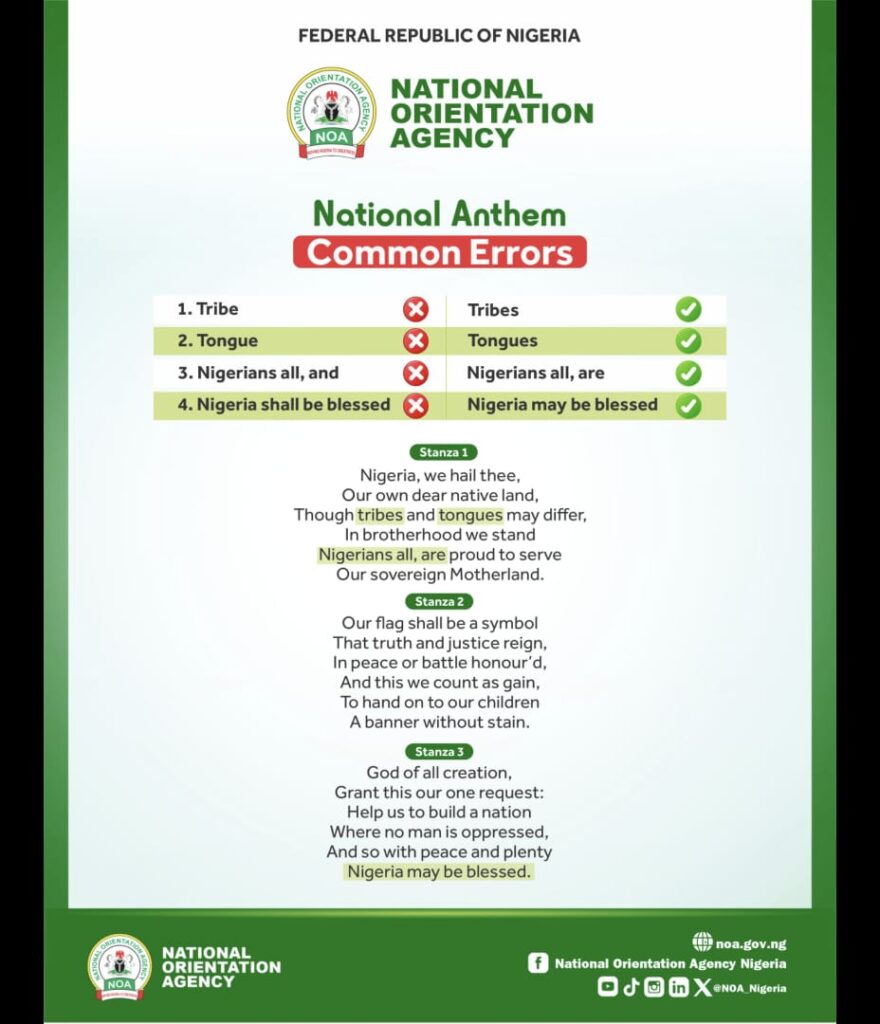
The following six submissions are made by me Chinedu Okwelogu, almost outgone Deputy Director and HOD Planning, Research, and Strategy Department, National Orientation Agency, Anambra State Directorate. In addition to having graduated from the English and Literary Studies Department of the University of Port Harcourt, I am a former English Language Examiner for WAEC and NECO.

The first three submissions comprise rehashes of my earlier outbursts on NOA platforms (adjusted for reproduction outside WhatsApp ) in outrage at the ‘modifications’ made to Nigeria’s National Anthem, said ‘modifications’ having been continued despite my objections to them a year ago.
The next two submissions are grammatical and poetic analyses of the verbicides inflicted on the National Anthem, while the last one is a short historical commentary on the status quo (ante) in regard to what happened in 1978.
SUBMISSION 1
I have said it before and I say it again without any fear of contradiction, that NOA is propagating an anomaly by changing aspects of the National Anthem.
Right from Independence up to 1978 when ‘Arise O Compatriots’ came into force, the third line of the first stanza of the Old National Anthem had been: ‘Though tribe and tongue may differ’.
It has a complete linguistic significance which is grotesquely eroded by adding ‘s’ to ‘tribe’ and ‘tongue’.
It is misleading to younger generations of Nigerians.
Older generations should speak up and counter this narrative.
SUBMISSION 2
The anthem is one that we sang throughout primary school and for most of secondary school.
‘Tribe’ is a generic noun meaning all tribes collectively and abstractly referenced; ‘tribes’ is the plural of the specific and common concrete noun ‘tribe’ which represents a group of people sharing common likes, dislikes, traits, characteristics, beliefs, etc.
If you substitute one for the other, you cause a grotesque change in meaning that the casual linguistic observer may not discern, but which is unforgivable in matters of national anthem rendition which should traditionally maintain historical accuracy.
SUBMISSION 3
Until someone can come up with what was wrong structurally, semantically, and/or stylistically with the old rendition of the original National Anthem, it is manifestly misleading to propagate what is currently being propagated as the correct thing.
SUBMISSION 4
The National Anthem is a poem and not an essay; Essay Writing is a different and distinct subgenre of Language from Poetry; therefore the rules and standards for judging Essay Writing are not necessarily the same as for Poetic Appreciation. Both activities require a conscious application of different mental dispositions and skill sets.
Now, what the insertion of the ‘intrusive esses’ has done to our National Anthem has been to upset the poetic symmetry of the line of verse they are contained in relative to the preceding and succeeding lines of verse not just in that stanza but in the following two stanzas.
Originally, ‘tribe’, ‘tongue’, and ‘brotherhood’ as used in the anthem were abstract nouns denoting principles and concepts; by adding esses to ‘tribe’ and ‘tongue’ we have removed that significant abstractness and replaced it with significant concreteness; and by not adding an ess to ‘brotherhood’ we have created an even more significant disjointedness in the flow of thought.
Furthermore, since this poem of a national anthem is designed for singing, the melody of the song is distorted by the ‘sss’ sound that is caused to be produced by the introduction of the esses.
The absurdity of the entire fiasco is more pronounced when a natural followup to the amendments in Stanza 1 is made in Stanza 3.
If ‘O God of all creation’ is subjected to the same modification standard as for ‘Though tribe and tongue may differ ‘, ‘all creation’ will have to become ‘all creations’ which has a totally different meaning from ‘all creation’.
While ‘all creation’ refers to the totality of things created or the totality of the state or condition of creating or being created, ‘all creations’ will mean an individual consideration of every single thing created.
The original abstract idea that runs through the entire anthem will be lost in the muddle occasioned by the introduction of intrusive esses.
SUBMISSION 5
Coming to the third blunder in this faulty rendition of the Old Nigerian National Anthem, after the first two blunders of the insertions of ‘intrusive esses’, we have the no less scandalous removal of the original ‘and’ and it’s replacement with ‘are’ in Line 5.
‘Nigerians all, and proud to serve’ means ‘We are all Nigerians, and we are proud to serve’. The damage of removing the ‘and’ and replacing it with ‘are’ is threefold:-
(1) the lofty dual emphasis on our Nigerianness and our disposition to serve proudly is eroded and replaced with a bland singular expression of all citizens being proud to serve
(2) the resultant construction ‘Nigerians all, are proud to serve’ forces ‘Nigerians all’ to become the subject of the verb ‘are’ (where there had been no such subject/verb relationship previously), creating a disharmonious transposition of noun and modifier in the noun phrase ‘Nigerians all’ which is not covered by poetic licence, culminating in a grammatical solecism from which there is no redemption
(3) the original comma (,) which separated the two notional main clauses ‘We are all Nigerians ‘ and ‘and we are proud to serve’ is forcefully and uglily transmuted to AN INTRUSIVE COMMA by its appearing between the new and faulty subject ‘Nigerians all’ (which should read ‘All Nigerians’) and the forced predicate ‘are proud to serve’.
A comma should NEVER come between a subject and its predicate.
It is just like saying ‘NOA, should correct these errors’ instead of ‘NOA should correct these errors’
NOA cannot launch a campaign exhorting Nigerians not to abuse National Symbols and then be concomitantly guilty of slaughtery and butchery of the National Anthem!
SUBMISSION 6
When the Federal Military Government was about to send this particular anthem into disuse in 1978, it embarked on a very methodical sensitisation of the Nigerian populace, using the print and electronic media, categorically saying that the first anthem had become too colonial for our contemporary national life of the period, and that a replacement was going to be had which was more reflective of our national milieu.
General Olusegun Obasanjo and Lieutenant General Theophilus Danjuma, two leading figures of that military administration, are still alive and can attest to the above claim.
At no point in the entire discourse was it remotely hinted let alone stated that Nigeria’s first National Anthem was being discarded because it contained grammatical and expressional errors.
At the time the Arise O Compatriots anthem came into effect on 1 October, 1978, this writer was in Class 4 of secondary school and so was in a position to be so knowledgeable about goings on as to be able to exercise substantial recall.



